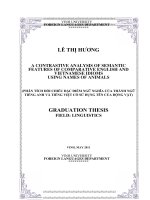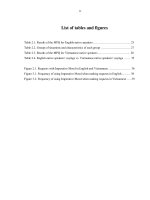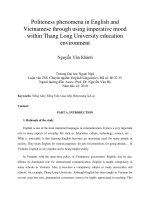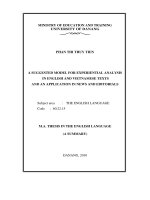Using English and Vietnamese metaphor for proper names
Bạn đang xem bản rút gọn của tài liệu. Xem và tải ngay bản đầy đủ của tài liệu tại đây (108.94 KB, 23 trang )
VIETNAM NATIONAL UNIVERSITY
HANOI UNIVERSITY OF LANGUAGE AND INTERNATIONAL
STUDIES
DEPARTMENT OF POST-GRADUATE STUDIES
SEMANTICS
(Final assignment)
Topic: Using English and Vietnamese
metaphor for proper names
Instructor: Dr Ha Cam Tam
Student’s name: Do Thi Phuong Thuy
Hanoi, 2010
1
Content
Part 1: Introduction
1. Rational……………………………………………….…………………….3
2. Aims of the study…………………………………….…………………….3
3. Methods of the study…………………………….………………………4
4. Scope of the study……………………………….……….………………..4
5. Design of the study………………………….…………………………….4
Part II: development…………………………………………..6
Chapter i:………………………………………………………………………….6
Theoretical background of metaphor IN ENGLISH.
I.1 What is metaphor?...................................................................................................6
I.2 Characteristic features…………………………………………………………….6
I.3 Classification of metaphor…………...……………………………………………6
Chapter Ii………………………………………………………………………...11
A study on English metaphor related to the proper names
II.1.1 Metaphor related to Boycott…………………………………………..………11
II.1.2 Metaphor related to
hooligan………………………………………………….11
II.1.3 Metaphor related to Pander…………………………………...………………11
II.1.4 Metaphor related to Tawdry…………………………………….…………….11
II.1.5. Metaphor in English idioms, proverbs and sayings related to the proper names
II.2.1 Metaphor related to the idioms “ happy as Larry”………………...…………12
II.2.2 Metaphor related to the proverb: Rob Peter to pay Paul………………………
12
II.2.3 Metaphor related to the idiom: any Tom, Dick or Harry……...………………12
II.2.4 Metaphor related to “peeping Tom”………………………………...………..12
II.2.5 Metaphor related to “ smart Alec”………………………………..………….12
II.3. Metaphor in English related to the characters in the literature…….………….12
II.3.1 Metaphor related to the character “Don Juan”……………………………….13
II.3.2 Metaphor related to the character “ Hitle”. ……………………...…………..14
II.3.3 Metaphor related to the character “ Vandals”…………………..……………14
II.3.4 Metaphor related to “ a paint Jane”………………………………..…………14
II.3.5 Metaphor related to “ painted Jezebel”…………………….…………………14
2
II.3.6 Metaphor relating to “Tarzan”……………………………...…………………14
chapter iii: metaphor related to proper names in English in comparison with
Vietnamese
III.1.Similarity in using proper names in Vietnamese……………………………….16
III.2. Difficulties in understand and translating words related to proper names in
English idioms and
proverbs………………………………………………………………………………
18
III.3. Suggestion to overcome difficulties………………...………………………….18
PART III: CONCLUSION………………………..……..
………………………..20
References…………………………………….……………………….21
3
Part i: introduction
1. rational.
Nowadays, with the development of society and technologies, English
has been used the most widely in the world. It not only plays an
important role in communication but it has many progressive effects in
many aspects of our life.
There are plenty of similarities and differences between English and
Vietnamese cultures not only in Grammar, lexicology translation,
phonetic but also in metaphorical meaning especially metaphor in
literature and idiom expressions. Therefore, deep understanding about
the uses of metaphor in everyday language not only helps students of
English increase vocabulary but also helps them understand new and
original metaphor when they hear or speak them.
Everyone knows that idioms and proverbs are the genius of national
language that is the key help learners know more about nation, as well as
custom and culture of each country all over the world. When studying
Vietnamese and English metaphor, what made me the most impressed is
that the proper names not only reflect the concepts bur also refer the
characteristic of person and places.
Importantly, metaphor help learners see the interest the beauties as well
as the culture color of language which help learners use and understand
correctly and clearly. I hope that learners will understand about metaphor
in English especially metaphor relating to the proper names that is also
the main reason motivating me to carry out this research.
2. Aims of the study.
My research aims are:
+ giving theoretical background of metaphor.
+ giving some difficulties of Vietnamese learners of English with idioms
in general and the idioms related to the proper names in particular.
4
+ giving some suggested solutions to overcome these difficulties,
+ finding the metaphorical characteristic of factors related to the proper
names in English idioms and literature.
3. Methods of the study.
The study on metaphor in not only English idioms but also literature
related to the proper names is carried out with comparative methods with
a hope that learners could see the role of metaphor in using idioms and
literature from some linguists, typical examples and extracted from
various types of books. Besides, idioms were collected from dictionary
to get valuable knowledge for this paper. Furthermore, Information
related to the research paper from websites was also looked into in order
to complete this research successfully.
4. Scope of the study.
During the study process, I have been attracted by metaphor - one of the
figures of speech as well as metaphor in English idioms and expression
about the proper names.
Because of time allowance and knowledge, I cannot cover all idioms and
proverbs on these issues but only focus on idioms related to proper
names, here is a sample of discussing on metaphor in English idioms:
typical proper names in literature and idioms, in each kind of proper
names, I introduce some outstanding idioms to illustrate for the research.
5.Design of the study.
The study consists of three parts.
Part 1 is introduction, including rationale, aims of the study, methods of
the study, scope of the study, and design of the study.
Part 2 is development that is divided into three chapters
Chapter 1 is background knowledge on the study. It supplies the
definition characteristic, classification and definition.
5
Chapter 2 is an analysis of metaphor in English related to proper names.
Chapter 3 is metaphor related to proper names is English comparison
with Vietnamese
Part 3 is a conclusion which gives a summary of the whole study
mentioned in the previous parts.
6
Part II: development
Chapter i:
Theoretical background of metaphor IN ENGLISH.
I.1 What is metaphor?
According to Oxford Advance Learner’s dictionary: metaphor is a word
or phrase used to describe somebody or something else, in a way that is
different from its normal use, in order to show that two things have the
same qualities and to make the description more powerful.
Ex: She has a heart of stone.
Ex: She is a fox.
The following sentences illustrate how the metaphorical understanding
of anger-as-fire is expressed:
Your insincere apology just added fuel to the fire.
After the argument, Dave was smoldering for days.
Boy, am I burned up!
I.2 Characteristic features.
I.2.1Similarity of shape.
Take the example:
Neck of the bottle
Mouth of the cave
Truong (1993:80)
In these examples, looking at metaphorical expression the “neck” is not a
neck-part of the human body, but it is the narrow part at the top of the
bottle, also the word “mouth” in the last one is a part of the body that is
small and round. Mouth is also used as a metaphor to refer the entrance
of a cave and the other example such as:
The head of a cabbage
The teeth of a saw
Truong (1993:80)
7
Finding many meaning of metaphors, the metaphorical expressions are
based on the identification of shape.
I.2.2Similarity of size
Look at the example:
Their daughter is quite plump but their son is positively elephantine
English –Vietnamese –Dictionary (1993:559)
The image of “elephantine” is used metaphorically make hidden
comparison with a big person
I.2.3 Similarity of position
Look at the following example:
The foot of a mountain
The heart of the country
Truong (1993:79)
Such expression as “foot of the mountain” is described as a similarity of
position “foot” is the lowest part of the body and it is used
metaphorically to refer to the foot mountain, the metaphor is stimulated
by the identification of the mountain. Further one, “heart” is used
metaphorically because; it is an important part of the body and in the
center position. In such way “leg of the table” or “tail of the procession”
and so on, we is also considered metaphors basing on the similarity of
position.
I.2.4 Similarity of movement
Look at the example:
They had to worm their way through the narrow
tunnel
The river snaked away into the distance
The image of “worm” is an animal with a soft rounded or flattened body.
It is put in the real context with function as a verb to compare with a
8
twisting movement of a person like a worm. The other example, the verb
“snake” is used as a metaphor based on the identification of movement.
I.2.5 Similarity of function
Basing on the similarity of function, these examples:
Key to the mystery
Head of the class
Hand of the clock
Truong (1993:80)
We easily see that “key”, “head” and “hand” in this cases are not a key to
open clock, head- part of the body and not a hand of the body, they also
do not belong to instrument, success or clock, in fact metaphorical
meanings in these examples are applied to any obstructing, this
transference of meaning is based on some common features to refer to
similarity of function.
I.2.6 Similarity of color
E.g.
The rose of clouds at down
An orange light
The words “rose” and “orange” are described as similarity of colour,
“the rose of clouds at down” is a kind of flower and it is used as a
metaphor to refer to the clouds that has rose of clouds. And the second
one “an orange light”, the word “orange” is a kind of fruit and it is as a
metaphor to refer to the lights that has orange color. Therefore, the
metaphorical expressions are based on the identification of color.
I.2.7 Similarity of behavior and character
Look at the following example
He is a fox
He is an Othello
Truong (1993:80)
9
The word “fox” here is a name of animal that indicates a big animal
which is very wise and clever. Fox is used metaphorically with the
negative meaning to refer to a person cunning character or if we say “he
is an Othello”, it refers to a person who is very jealous, that are used as
metaphor based on the similarity of character and behavior.
I.3 Classification of metaphor
I.3.1 Living metaphor
Living metaphor that can be called active metaphor is one which
relatively new and has not become part of everyday linguistic usage. It is
created and used by individuals. Living metaphor, according to Hoang
Tat Truong (1993:81): “When a word has an unusual metaphorical sense
or the metaphor is created and used by an individual".
E.g:
You are my sun
Perelman (1999:88)
I.3.2 Fade metaphor
According to Hoang Tat Truong (1993:81) “fade (trite) metaphor is one
that has lost its freshness due to long and traditional use". And it is
necessary to note that the meanings of faded metaphor are registered in
dictionaries since they are of common use. We can take the following
metaphor for example:
E.g:
Her voice is sweet
She is a snack
Truong (1993:81)
I.3.3 Dead metaphor
According to Hoang Tat Truong (1993:81) “Dead metaphor is a
metaphor which is no longer felt as a metaphor because the direct
10
meaning of the word has been completely last" we can look at following
example for a highlight.
E.g:
To ponder
All theoretical background mentioned above aim to provide a
theoretically fundamental basis that is a key which helps me get more
knowledge and experience in studying metaphors about proper names in
many aspects and expressions that will be referred to in the next chapter
11
Chapter Ii
A study on English metaphor related to the proper names
II.1.1 Metaphor related to Boycott.
The words “boycott” here is used to metaphorically to refer to refuse to
deal with or a refusal to deal with in order to see the mean of boycott
clearly, look at the following example:
E g:
The anarchist speaker urged all citizens to boycott the elections
O’ Dell (1995:30)
The word “boycott” named after a land lord in Ireland who made himself
unpopular by his treatment of his tenants and was socially isolated.
II.1.2 Metaphor related to hooligan
The word “hooligan” is used to metaphorically refer a rough, lawless
youth which named from the Irish family name hooligan
E g:
Acts of vandalism committed by football hooligans
O’ Dell (1995:30)
II.1.3 Metaphor related to Pander
The word “pander” named from Pandaros, a procurer or pimp in
Ancient Greek mythology. So as to further understand the meaning and
the using of the word “pander”, look at the following example:
E g:
Newspaper pandering to the public love of scandal.
O’ Dell (1995:30)
The word “pander” in this case refers to indulge someone’s desire
II.1. 4 Metaphor related to Tawdry.
The word “tawdry” is used to metaphorically refer to cheap and
tasteless. Look at this example:
12
E g:
He is only a tawdry person
O’ Dell (1995:30)
The word “tawdry” named from ST Audrey, at whose cheap gaudy
scarves wore sold.
II.1.5. Metaphor in English idioms, proverbs and sayings related to
the proper names
II.2.1 Metaphor related to the idioms “ happy as Larry”.
The idioms “happy as Larry” here is used to metaphorically to refer to
extremly happy. Look at the example:
E g:
She is happy as Larry
This mean the degree of emotion “great happy” the word “Larry” was
named after in Australia or New Zealand and dated from around 1875. It
has been suggested that it comes from the name of the Australia boxer
Larry Foley though why he was particularly happy no one seems to
know he won a lot of contests.
II.2.2 Metaphor related to the proverb: Rob Peter to pay Paul.
The idiom “Rob Peter to pay Paul” is used to metaphorically referring
to taking away from one person in order to give to another. Look at the
example.
E g:
He is a rob peter to pay Paul
www.usingenglish.com
This proverb expresses not in this sense of robbing the rich to pay the
poor but of behaving illogically or falling to solve a problem by merely
creating other early appearances of proverbs show the reference is to St
Peter and St Paul as two men of equal sainthood.
II.2.3 Metaphor related to the idiom: any Tom, Dick or Harry.
13
The list has included other names down the centuries such as Jack and
Will- Shakespeare has Tom, Dick and Francis in Henry IV
E g:
He won’t talk to any Tom, Dick or Harry
B J Thomas (2002:114)
This mean is person is a real snob; he’s only interested in people who are
rich or famous.
II.2.4 Metaphor related to “peeping Tom”
Eg:
They are some peeping Tom
Someone who spies on the other people, especially by looking through
their windows, is called a peeping Tom.
B J Thomas (2002:114)
II.2.5 Metaphor related to “ smart Alec”
Take an example:
Eg:
He’s just a smart Alec
The word “smart Alec” refers to a person being very show-off, he
always thinks he knows everything.
B J Thomas (2002:114)
II.3. Metaphor in English related to the characters in the literature.
II.3.1 Metaphor related to the character “Don Juan”
Don Juan is a character who has bad behaviour and always flirt beautiful
girls anywhere he went. Therefore Don Juan became a love of many
women, or lady-killer.
E g:
He is a Don Juan
Truong (1993:80)
II.3.2 Metaphor related to the character “ Hitle”.
14
The word “Hitle”is named of the shogun who very cruel. He killed a lot
of people in the second World War, therefore the word “ Hitle”
indicates the person who is cruel.
Eg
He is a Hitle
Thu (2006:12)
II.3.3 Metaphor related to the character “ Vandals”
The word “vandal” was formed by in a story, the character is vandal
who always destroyed anything and the word “Vandal” indicates the
person who is destructive people
E g:
He is a Vandal
www.usingenglish.com
II.3.4 Metaphor related to “ a paint Jane”
E g:
She is a paint Jane
www.usingenglish.com.
This means a woman who isn’t particularly attractive.
II.3.5 Metaphor related to “ painted Jezebel”
Jezebel was the wife of Ahab, king of Israel, whom she introduced to the
worship of Baal, the god of the Phoenicians, while persecuting the
prophets of the Hebrew god, Jehovah and drawing down upon herself the
denunciation of Elijah. In II Kings, 9, she is referred to in connection
with whored one’s and witchcrafts and her use of cosmetics (verse 30)
has given risen to the expression a painted Jezebel for a woman who
flaunts herself provocatively.
E g:
She is a painted Jezebel
www.usingenglish.com
15
This means shameless, immoral, scheming woman.
II.3.6 Metaphor relating to “Tarzan”
Look at the example
Eg:
He looks like Tarzan
B J Thomas (2002:114)
Tarzan is name of character in story of Edgar Rice Burroughs. Tarzan is
used to metaphorically refer to a body-builder and weight-lifter
In summary, there are a large number of Metaphors related to the proper
names. However, due to the scope of my study, I only focus on several
English idioms on typical proper names, characters in literature and so
forth. I hope that this study will help learners of English understand more
about metaphorical expressions in English idioms.
16
chapter iii: metaphor related to proper names in english in
comparison with Vietnamese
III.1.Similarity in using proper names in Vietnamese
There are a lot of similarities in using proper names in Vietnamese,
especially to relate to the characters in literature and with the following
example, we can see it more clearly that both English and Vietnamese
have an equivalent in using the proper names as a metaphor.
III.1.1 Similarity in using proper names between “ Little Lord
Fautleroy” and “ M· Gi¸m Sinh”
E.g:
He is little Lord Fautleroy
The word “ Little Lord Fautleroy” is referred to elegantly-dressed person,
in Vietnamese the name “Little Lord Fautleroy” is also used
metaphorically to express the character of the story “ KiÒu”- Nguyen Du
poet, the name of “ M· Gi¸m Sinh”.
III.1.2 Similarity in using proper names between “ Scrooge” and
HuyÖn Hinh”
Basing on the characteristic, we can understand many equivalent in
proper names. With the name of “ Scrooge” refers to very mean person in
Christmas Carol by Charles Dickens, in Vietnamese the name “ Scrooge”
is used metaphorically to express the name of character of the story “
§ång hào có ma by Nguyễn Công Hoan, the name of character is
HuyÖn Hinh who express the same characteristic of Scrooge.
III.1.3 Similarity in using proper names between “Jekyll and Hyde”
and “TRÞnh H©m”
E.g:
He is got a Jekyll and Hyde
We can see the name “Jekyll and Hyde” is referred to a man with two
contrasting personalities, one gentle and one murderous in novel by R L
17
Stevenson. However, there is a character in Vietnamese literature having
an equivalent, that is name of character in story “ Lôc Vân Tiên, the
character Trịnh Hâm has also the similariry of characteristic.
III.1.4 Similarity in using proper names between “Don Juan” and “
Së Khanh”
E.g:
He is a Don Juan
Truong (1993:90)
If the name of “Don Juan” refers to a character who has bad behaviour
and a love of many women, the character in the story “KiÒu”-Së Khanh
is also a person who always flirt and deceive many women.
III.1.5 Similarity in using proper names between “painted Jezebel”
and “ThÞ Në”
e.g:
She is a painted Jezebel
B J Thomas (2002:114)
The word “painted Jezebel” has an equivalent in Vietnamese literature
which has the same appearance such as ugly and particularly attractive,
that is a character in story “ChÝ phÌo” Nam Cao writer. The character
“ThÞ Në” is a typical character who express clearly.
III.1.6 Similarity in using proper names between “Smart Alec” and “
Cô cè Hång”
e.g: He’s just smart Alec
B J Thomas (2002:114)
the story “ Sè §á” by Vị Träng Phơng , the character “ Cô cè Hång” is
referred to a person
very show-off, he always thinks he knows
everything, but English people usually refer to “ Smart Alec” having the
same characteristic.
18
In short, metaphorical proper names are used differently in two languages
and cultures. Therefore, in order to understand and know the metaphor
related to proper names, we will learn more knowledge not only from
school but also from many books.
III.2. Difficulties in understand and translating words related to
proper names in English idioms and proverbs
Learners are likely to meet troubles in translating these idioms related to
the proper names into Vietnamese or finding Vietnamese equivalences to
convey some kinds of meaning, because each nation has its own system
of language, geographical circumstances, national and social condition
as well as the development levels of society, which forms different
national characteristic and culture. Therefore, together with the same
thought and awareness, each language has different expression, addition
to Vietnamese and English people have their own expressions and
different ways to understand the idioms related to the proper names. It is
due to different cultures between two countries to refer to the
characteristic of jealous person the English take the image of “ He is a
Othello”, while the Vietnamese take the image of Hắn đúng là ®å
ho¹n th” and so forth.
Studying further proper names, I can see these differences in culture, for
instance if Vietnamese people often say that the characteristic of greedy
person is “ tr b¸t giíi” but the England will say that “ Billy Bunter”
To sum up, in English, meaning of the proper names are often different
from word-for-word translation, furthermore, each of proper names is
both used in a specific context. Hence, it is necessary to learn English
metaphor related to the proper names is not always easy for learners.
III.3. Suggestion to overcome difficulties
With these difficulties mentioned above, learners of English need spend
time studying English idioms seriously and improving their knowledge
19
of both English and Vietnamese culture as well as habits by reading more
books, novel or short stories and collecting English idioms, then learning
the exact meaning of idioms. Metaphoric images play an important role
not only comprehension idioms but also characters in literature.
So that, it is easy to learn and understand metaphor related to the proper
names by putting these proper names in specific contexts and making
sentences related to proper names. It helps to memorize both proper
names and idioms related to the once. Importantly, I myself find that
metaphor is one of the main parts of lexicology- one of three main
dimensions of a language study, especially in the folklore of idioms and
expressions; this is both interesting and difficult to approach. I hope that
I will have chances to studying about this as a saying goes “study, study
more, and study forever”
20
PART III: CONCLUSION
One of rhetorical methods that is widely used in proper names is
metaphor. It plays an important role in making the meaning of not only
idioms but also characters in novels more figurative and vivid. Being
aware of its importance. I decided to analyze metaphors in English
idioms and eponymous related to the proper names.
In chapter 1, a general theoretical background of metaphor has been
presented, which help people make sense of the role of metaphor.
In chapter 2 a series of English metaphor related to the proper names
were analyzed and illustrated by lots of examples that help learners
improve their knowledge of metaphor in proper names in general, in
English idioms related to the proper names in particular. Furthermore
English metaphors related to the proper names have been presented with
Vietnamese
equivalences.
They
provide
learners
with
better
understanding of the culture among countries.
In the final, chapter 3 English metaphor related to the proper names have
been presented with Vietnamese equivalences and difficulties that
Vietnamese learners often face when studying English idiom and proper
names are also pointed out. By studying some suggested solutions,
learners can choose the effective ways or methods to learn English idiom
related to the proper names. This chapter ends with some types of
exercises as a sample to give learners chances to practice using it.
In short, I have summed up what have been mentioned in my research
paper with a hope learners of English will get benefits from this study to
learn English metaphor related to the proper names better.
21
References
Books
1. AS Hornby 1990. Oxford Advance learner’s dictionary of current
English.
2. B J Thomas 2002 Advanced Vocabulary & Idiom.
3. Liz & John Soars 1995 Headway student’s book.
4. Michael Mc Carthy Felicity O’ Dell 1995. English vocabulary in use.
5. Thoa, N. Y. T. (2005) Assignment on Language and Culture in
Contact. Vietnam National University- Hanoi.
6. Trêng, H T, 1993 Basic English Lexicology. National University
College of Foreign language.
7. Tõ diĨn Anh-ViƯt 1993. Nhµ xt b¶n TP HCM
22







